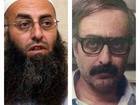U.N. Special Coordinator for Lebanon Sigrid Kaag emphasized that the Lebanese officials are primarily accountable for the political and economic situation, stressing that the long-term relations with regional countries might play a positive role in several pressing issues.
“The primary responsibility lies on the Lebanese officials whether regarding the political or economic situations,” said Kaag in an interview with Iran's News Agency IRNA on Monday.
 Full Story
Full Story
A Syrian rebel group said Saturday that a rare ceasefire negotiated with Hizbullah fighters in a Syrian town and two villages was over as shelling resumed.
The 72-hour ceasefire in the northern rebel-held town of Zabadani, near the border with Lebanon, as well as in Foua and Kafraya, two Shiite villages in Idlib province, was reached earlier this week and was to last until Sunday.
 Full Story
Full Story
Lebanese authorities on Saturday arrested a fugitive Islamic cleric wanted for his role in deadly clashes with the army as he tried to flee the country.
Ahmed al-Asir was apprehended at Beirut's Rafik Hariri International Airport while trying to travel to Nigeria via Cairo with a fake Palestinian passport, General Security announced.
 Full Story
Full Story
The lunch that brought together Army Chief General Jean Qahwaji and the Commando Regiment chief Brig. Gen. Chamel Roukoz was not a private event and did not have any political connotations, al-Joumhouria daily reported on Saturday.
“The lunch between Qahwaji and Roukoz was a public event that took place in the presence of a number of army officers. It was not a solo lunch nor did it have any political connotations,” prominent sources told the daily on condition of anonymity.
 Full Story
Full Story
Employees of the Beirut Port held a sit-in on Thursday protesting an alleged government decision to use a nearby real estate as a dump site.
MTV said that more than 100 employees staged the sit-in and prevented trucks transporting goods from entering the port causing long queues at the Port entrance.
 Full Story
Full Story
Justice Minister Ashraf Rifi emphasized on Thursday that the Free Patriotic Movement led by MP Michel Aoun will not succeed in widening the gap between the Christians and Muslims, al-Mustaqbal daily reported.
“Aoun will not be succeed to drag us against our convictions of Muslim-Christian partnership,” said Rifi in an interview to the daily.
 Full Story
Full Story
Progressive Socialist Party leader MP Walid Jumblat stressed on Sunday that the Minister of Environment is not to blame for the waste management crisis and that those who put the letter of conditions are accountable.
“The areas of Metn, Aley and Chouf need to know where they should throw the trash. Those who put the letter of conditions are to blame. It is not the fault of the Environment Minister,” said Jumblat in statement addressing people of Shahhar.
 Full Story
Full Story
Israel has arrested a Swedish man of Lebanese origin and charged him with being an agent of Hizbullah, Israeli authorities said on Sunday.
Hassan Khalil Hizran, 55, was detained on July 21 but his arrest was kept under wraps until now.
 Full Story
Full Story
Speaker of Paraguay arrived in Beirut at the head of a parliamentary delegation at the official invitation from Speaker Nabih Berri, the state-run National News Agency said on Sunday.
Six members of parliament and several members of the Lebanese community in Paraguay accompanied the Speaker.
 Full Story
Full Story
A 25-year-old man who was believed to be missing overnight came back home Sunday morning after claims that he was tortured and robbed by unknown assailants, the National News Agency reported.
Janah Chafiq Abdul Khaleq, from Aley's Majdal Baana was believed to be missing when contact was lost with him at night.
 Full Story
Full Story



